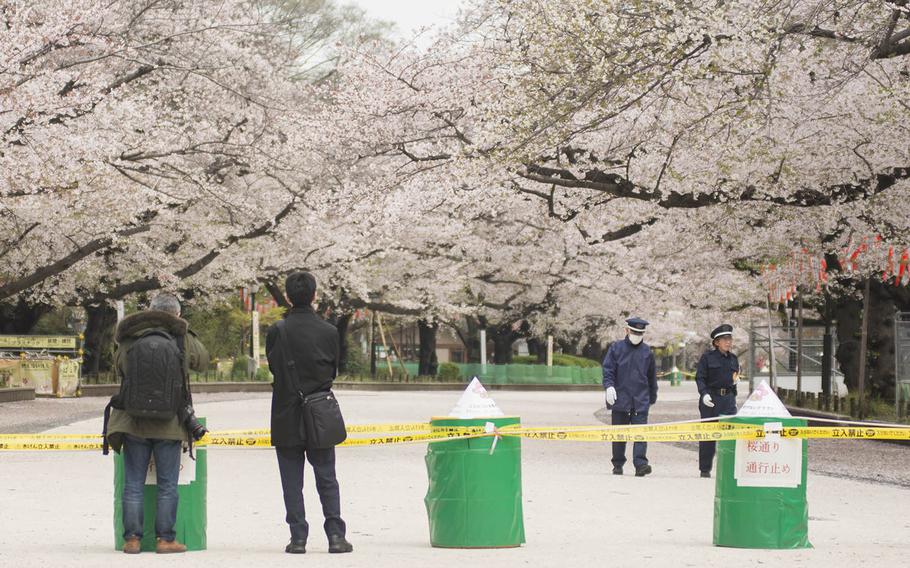
People check out cherry blossoms, which have been blocked off because of the coronavirus pandemic, at Ueno Park in Tokyo, Monday, March 30, 2020. (Akifumi Ishikawa/Stars and Stripes)
Stars and Stripes is making stories on the coronavirus pandemic available free of charge. See other free reports here. Sign up for our daily coronavirus newsletter here. Please support our journalism with a subscription.
TOKYO — Japan has no plans to declare a state of emergency in April, despite rumors to the contrary, the country’s top spokesman said Monday.
Rumors spread on the internet say the Japanese government is seriously considering declaring a state of emergency, that it plans to make the announcement Wednesday and lock down Tokyo on Thursday.
“That is not true. I clearly deny it,” Chief Cabinet Secretary Yoshihide Suga said at a news conference.
Suga said that various requests by the government, such as shutting down schools, have inconvenienced the Japanese people but are necessary to avoid tougher measures.
“We are not in a state where it’s necessary to declare state of emergency,” he said.
As of Tuesday, Japan had 1,953 confirmed cases of coronavirus and 56 deaths, according to the Ministry of Health, Labour and Welfare. Tokyo has counted 499 cases and 15 deaths as of Tuesday, according the Tokyo Metropolitan Government website.
A national law passed earlier this month allows the prime minister to declare a state of emergency when rapid spread of the virus poses a serious threat to people’s lives and the economy.
The decision to declare a state of emergency will carefully be made based on advice by a wide range of experts, Suga said.
Prefectural governors can request or instruct people to stay home and close schools and businesses if a declaration is made.
Also Monday, Tokyo Gov. Yuriko Koike once again urged people to stay away from night spots, as an effort to prevent an explosive increase of infections.
The request came after the Japanese government’s cluster-countermeasures experts disclosed that 38 people in Tokyo, whose infection routes were unclear, likely contracted the virus at establishments where a staff waits on customers, such as bars and hostess clubs.
People affected range in age from 20s to 70s, including both customers and workers, according to documents presented by the Tokyo government.
“These places have high risk of infection,” Koike said at a news conference. She noted those places are usually closed and crowded spaces, poorly ventilated, where customers and staff converse in proximity.
Koike urged young people to stay away from karaoke establishments and clubs and older people to stay out of bars. She also called for residents to continue to stay home on weekends.
“We urge each every one of you to act appropriately, so that those without symptoms or with minor symptoms won’t unknowingly spread the virus,” she said.
kusumoto.hana@stripes.com Twitter: @HanaKusumoto